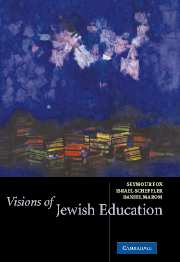Book contents
- Frontmatter
- Contents
- Preface and Acknowledgments
- About the Mandel Foundation
- Introduction
- Part I The Visions Project
- Part II Visions in Detail
- Introduction
- 4 What Must a Jew Study – and Why?
- Supplement: Isadore Twersky
- 5 Jewish Studies in Israel from a Liberal-Secular Perspective
- Supplement: Menachem Brinker
- 6 We Were as Those Who Dream: An Agenda for an Ideal Jewish Education
- Supplement: Moshe Greenberg
- 7 Reflections on the Educated Jew from the Perspective of Reform Judaism
- Supplement: Michael A. Meyer
- 8 Educated Jews: Common Elements
- Supplement: Michael Rosenak
- 9 The Concept of the Educated Person: With Some Applications to Jewish Education
- Supplement: Israel Scheffler
- Part III Visions in Context
- Conclusion: The Courage to Envision
- The Visions Project: Participants and Forums
- Index
7 - Reflections on the Educated Jew from the Perspective of Reform Judaism
Published online by Cambridge University Press: 08 January 2010
- Frontmatter
- Contents
- Preface and Acknowledgments
- About the Mandel Foundation
- Introduction
- Part I The Visions Project
- Part II Visions in Detail
- Introduction
- 4 What Must a Jew Study – and Why?
- Supplement: Isadore Twersky
- 5 Jewish Studies in Israel from a Liberal-Secular Perspective
- Supplement: Menachem Brinker
- 6 We Were as Those Who Dream: An Agenda for an Ideal Jewish Education
- Supplement: Moshe Greenberg
- 7 Reflections on the Educated Jew from the Perspective of Reform Judaism
- Supplement: Michael A. Meyer
- 8 Educated Jews: Common Elements
- Supplement: Michael Rosenak
- 9 The Concept of the Educated Person: With Some Applications to Jewish Education
- Supplement: Israel Scheffler
- Part III Visions in Context
- Conclusion: The Courage to Envision
- The Visions Project: Participants and Forums
- Index
Summary
In the Eternal, in the depths of life and on its heights, teacher and student, maturity and youth, can come together. Of the Eternal alone can they speak with one another; on all else they can only converse. It is religion that creates the connection.
Leo Baeck, “Religion und Erziehung” (1926)Introduction
A dominant theme in the writings of Leo Baeck, the theologian and leader of German Jewry during its darkest hours, is the presence of polarities within Judaism. God, he insisted, is for religious Jews both unfathomable mystery and the source of inescapable commandment. My own worldview has been greatly influenced by his: negotiating the religious path of Judaism, I believe, necessarily involves passing between opposing poles, living in the tensions that they create. If, as Baeck suggests in the excerpt cited above, all true Jewish education is religious education on the highest level, then such an education must confront the tensions without evasion.
These tensions do not begin with modernity, nor are they limited to the liberal currents in Judaism. Prophets and priests in ancient Israel expressed truths about God's nature that did not contradict one another but existed in a state of opposition: prophets spoke of God's insistent moral judgment; priests brought God's presence near through sacrifice on the altar. Millennia later, within the traditional Jewish society of Eastern Europe, Hasidim and Mitnagdim struggled over the conflicting demands of prayer and study. Which of the two brings one more closely into God's presence?
- Type
- Chapter
- Information
- Visions of Jewish Education , pp. 149 - 161Publisher: Cambridge University PressPrint publication year: 2003
- 8
- Cited by



